Supporting customers in SaaS feels like an entirely different job than most other industries.
Instead of high volume transactional support tickets or helping one customer in their journey (like in B2C support), you're helping customers with complex issues. Your customer relationships themselves are complex — you might work with many different users on the same account. Each customer’s environment may be customized and built uniquely for their needs.
The challenges are real, and that means choosing the right SaaS help desk software is an especially important factor in your customer support strategy and your company’s future growth.
A small, founder-led startup may just want a simple shared inbox. A developer-first company may need APIs to customize everything. An enterprise organization might prioritize compliance, integrations, and advanced analytics.
In this article, we’re breaking down the eight best SaaS help desks with a focus on what makes each one unique, so you can create a short list of help desks that might be right for your company.
1. Help Scout — Best SaaS help desk for ease of use and affordability
What makes Help Scout stand out is how it strikes a great balance between intentional simplicity and enterprise-grade readiness. It’s designed for SaaS teams that want to grow without inheriting the complexity of older, clunky systems.
Inbox
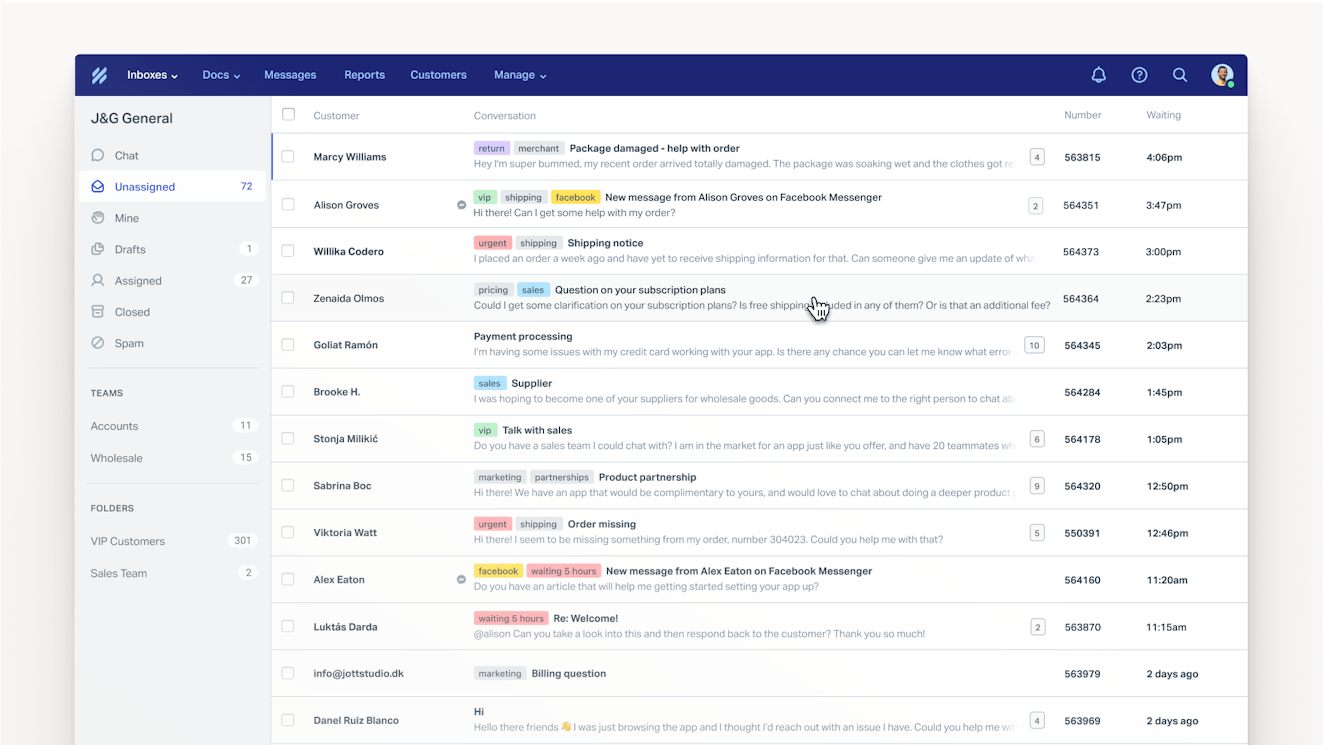
Help Scout’s Inbox is an email-like interface that makes it easy to onboard new team members quickly while still providing features that scale seamlessly alongside your business. An early-stage SaaS company can implement Help Scout today to start providing lean customer support, then add channels, workflows, and automations as they grow.
Inbox consolidates email, chat, and social conversations into a single location, giving you everything you need to manage customer conversations in one place.
For SaaS companies, important features like customer profiles and flexible conversation assignment automations also make it easy to understand who you’re interacting with and to route those conversations based on your unique needs.
Docs
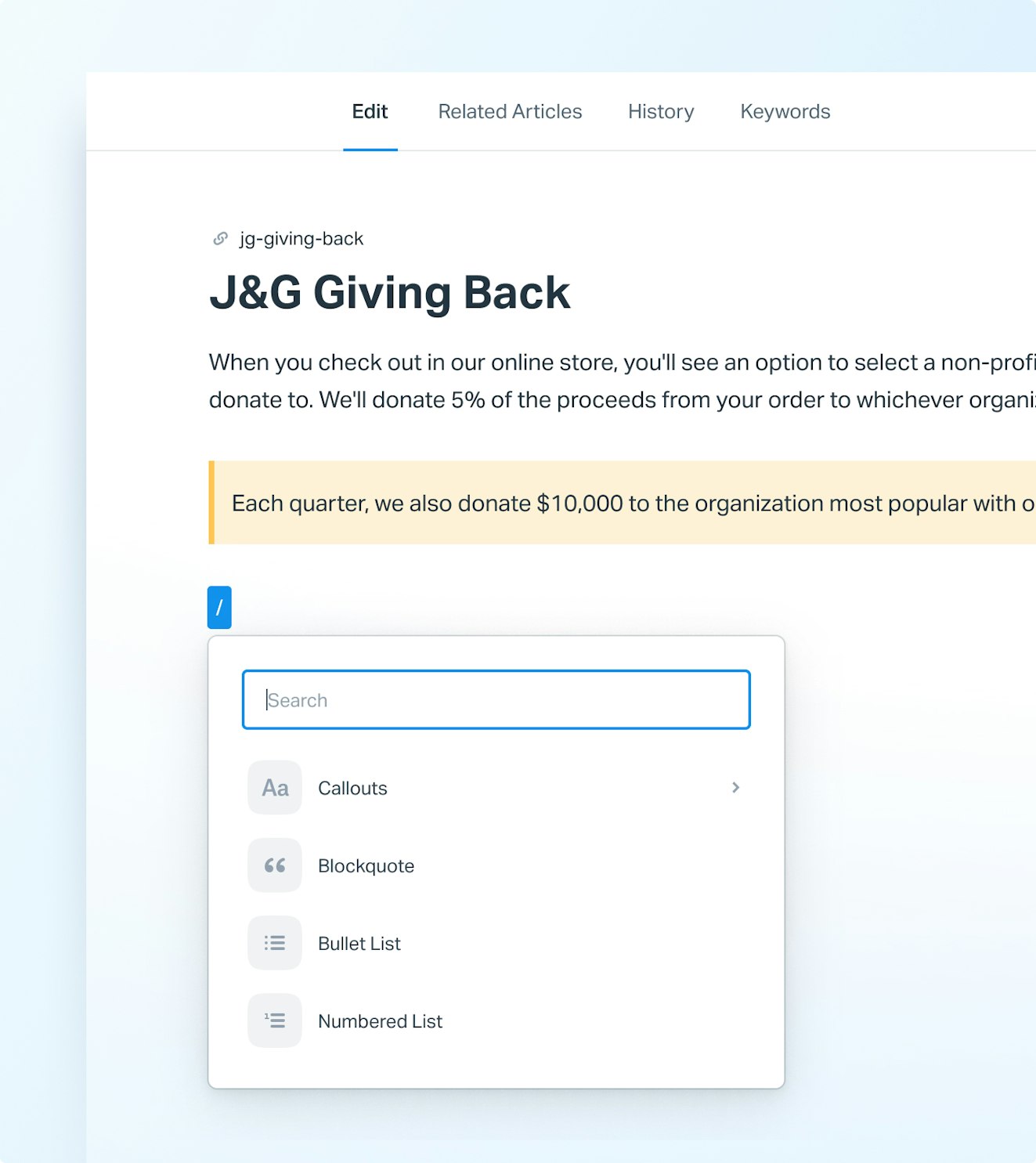
Docs provides SaaS companies with a branded knowledge base that makes it easy to empower customers to self-serve.
You can create articles quickly, organize them however you’d like, and customize the look to match your brand. Built-in reports show you what customers search for and where content gaps exist, helping you improve your knowledge base over time.
For growing SaaS teams, it’s a straightforward way to scale self-service support without adding complexity.
AI support
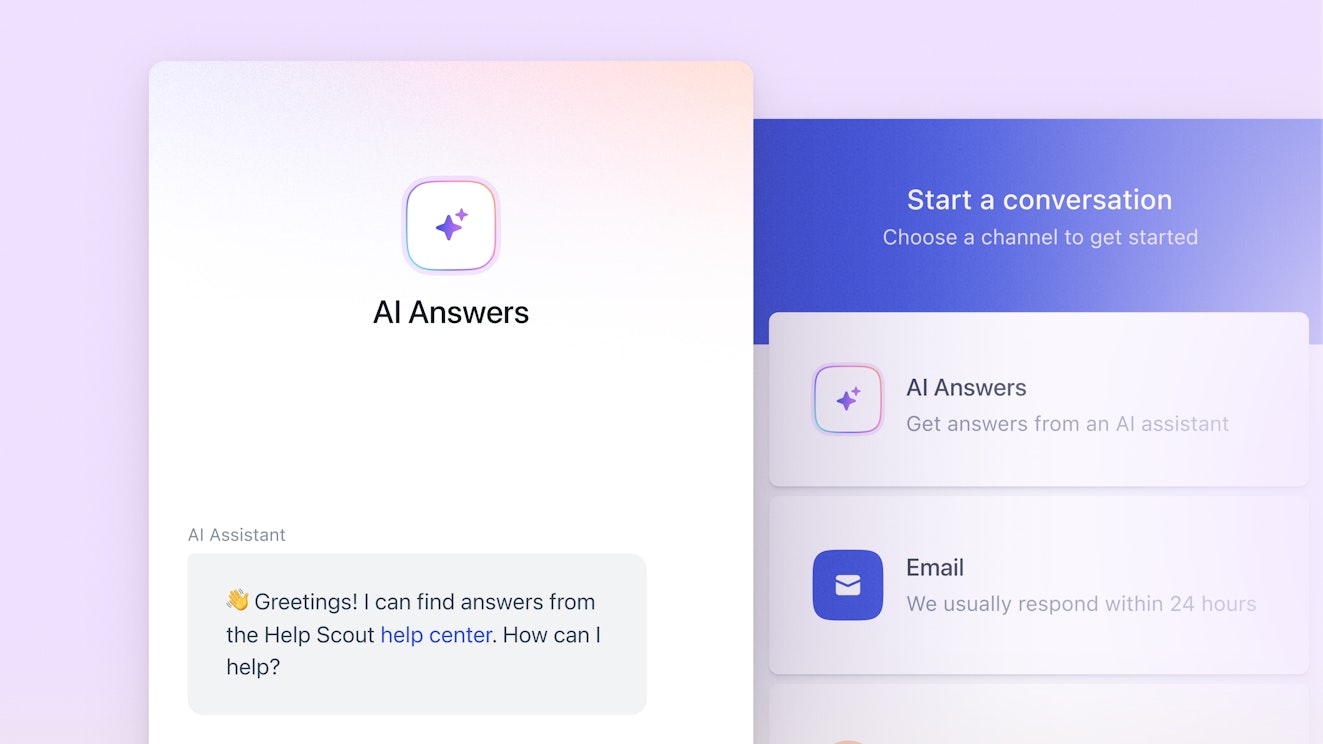
Lastly, Help Scout’s AI features make your team more efficient while ensuring responses remain human and empathetic, meaning you’re able to scale without losing touch with your customers. AI features include:
AI Summarize to condense long customer conversations into a few bullet points, making handoffs and escalating conversations easier — really good news for SaaS companies.
AI Assist to check your grammar, translate a response, adjust the tone, or expand or shorten a message based upon a human agent’s first draft.
AI Drafts to automatically draft replies to customer messages, which your team can edit or send as-is.
AI Answers to add AI functionality to Beacon (Help Scout’s messaging tool), enabling it to generate instant replies based on your Docs and additional sources like your website.
Unlike competitors that require intensive setup or bring an overwhelming number of features that you’ll probably never use, Help Scout emphasizes focus and usability.
Key features for SaaS teams
Shared inbox across email, chat, and social channels, which can be aggregated in views by individuals or by company, giving you a full view into each account’s conversations.
Docs knowledge base with search engine optimization, which also serves as the base for in-app self-service and AI training material.
Beacon for in-app, proactive support, through Messages that keep customers engaged and informed.
Workflows to automate routing, tagging, and prioritization, keeping your operations simple for growth.
Key AI functionality that makes your team more effective and efficient so they can focus on serving your customers.
Compliant with SOC2 Type 2, HIPAA, GDPR, and UK-GDPR as well as with U.S. regulations like CCPA to keep your customer data protected every step of the way.
Pricing
Free plan and trial available. View Help Scout's current pricing.
Learn more about Help Scout:
2. Pylon — Best SaaS help desk for support via Slack and Teams
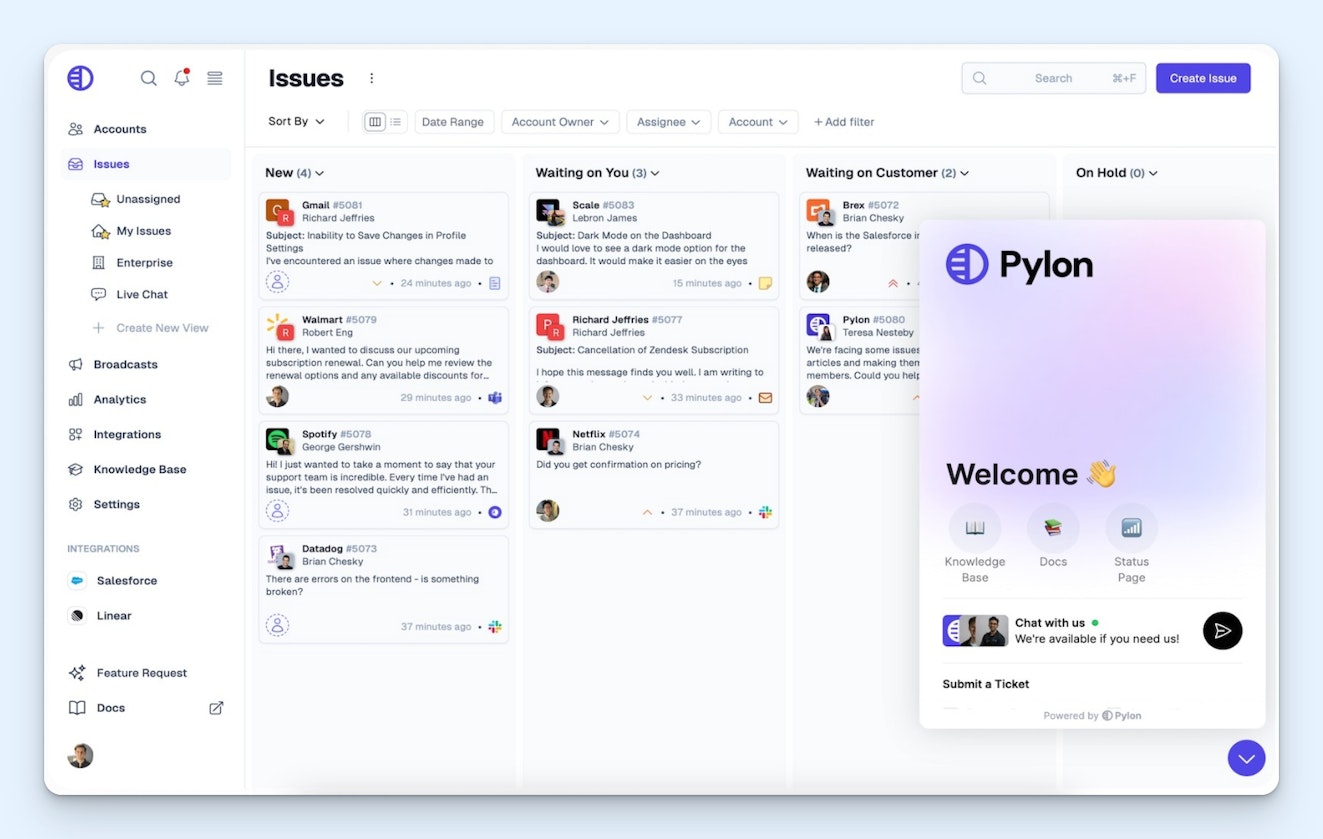
Pylon is built for SaaS companies whose customers expect support directly within collaboration tools like Slack, Microsoft Teams, and Discord. Rather than converting everything into email tickets, Pylon reduces friction by primarily integrating support into the tools customers already use.
When it comes to customer service philosophy, Pylon takes an AI-native approach in almost every aspect of its platform. One specific feature that highlights this is its ability to generate reports based on a prompt, which means you can ask any question you have about a customer, and it will create charts to help you visualize the response.
Pylon has recently been launching features more traditionally included in customer success tools, such as consolidating customer context including renewal cycles, usage data, and open issues. Combined with AI-powered triage and knowledge surfacing, Pylon enables teams to scale high-touch service in Slack or Teams efficiently.
Key features for SaaS teams
Omnichannel support: Slack, Teams, Discord, email, and chat.
AI-powered triage, reply drafts, knowledge detection.
AI-augmented knowledge base with translation.
Account intelligence with health scoring, renewals, and usage data.
SOC 2, ISO 27001, HIPAA, and GDPR compliance.
Pricing
No free trial available. View Pylon’s current pricing.
3. Plain — Best SaaS help desk for developer-first teams
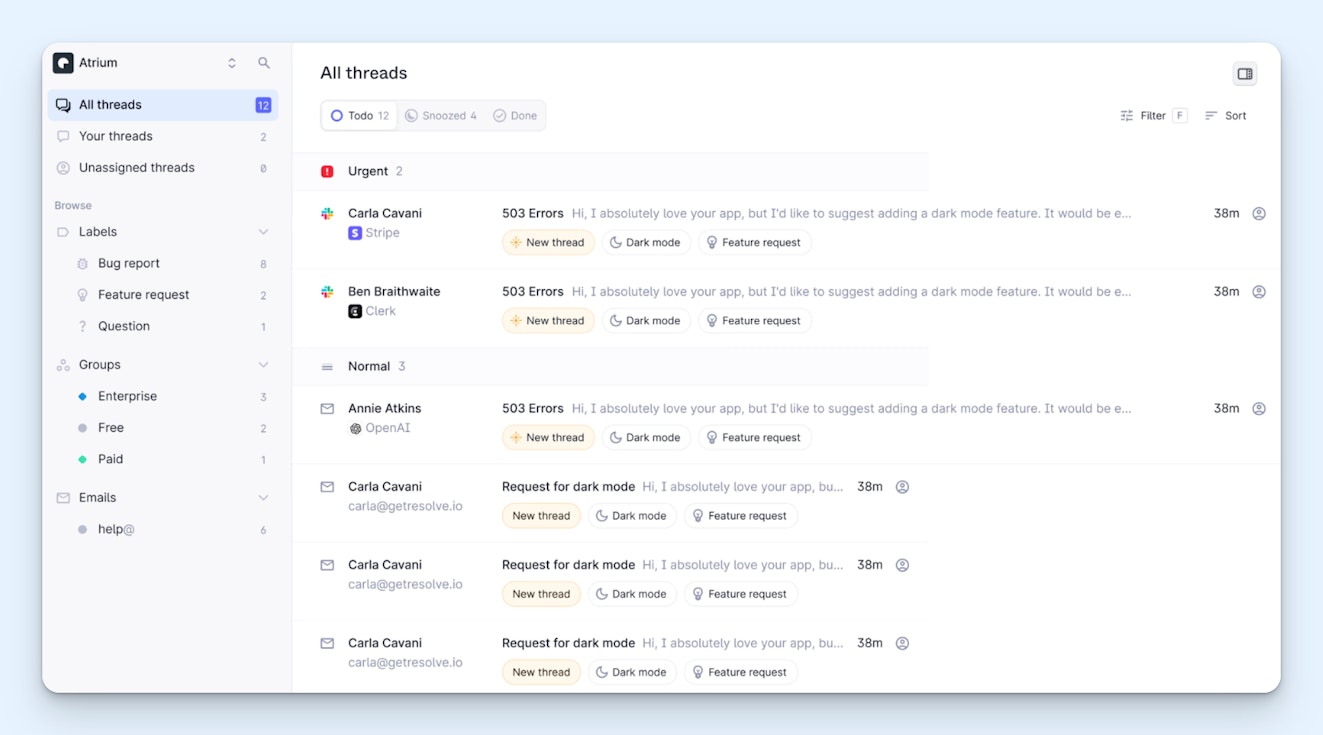
Plain caters to engineering-led SaaS companies. Its GraphQL API-first design means every feature is programmable. This makes Plain ideal for teams that want to build highly tailored support workflows and integrations.
Where Plain is unique is in its developer-first philosophy. The entire product is built as an API-first platform, so teams can design custom experiences, embed support deeply into their product, and even automate complex workflows without relying on a vendor’s interface. Its minimalist UI aims to support developers, with building to their way of working.
It also consolidates support channels like Slack, Teams, Discord, and email and integrates directly with GitHub, Linear, and Jira. Leveraging AI triage and routing, it ensures those channels stay clean so you never miss a contact. The team-based pricing model avoids per-user charges, which makes it attractive for rapidly expanding support teams.
The big trade-off? Non-technical support teams may find the platform less intuitive, as its power is unlocked primarily through engineering efforts.
Key features for SaaS teams
GraphQL API-first customization with programmable workflows.
Unified inbox across Slack, Teams, Discord, and email.
Native integrations with GitHub, Linear, and Jira for developer ecosystems.
In-app support widgets that can be customized via API.
Minimalist, developer-friendly UI designed for technical teams.
AI-powered routing and triage, summaries, and replies for team effectiveness.
Pricing
Free trial available. View Plain’s current pricing.
4. Front — Best SaaS help desk for AI-augmented support
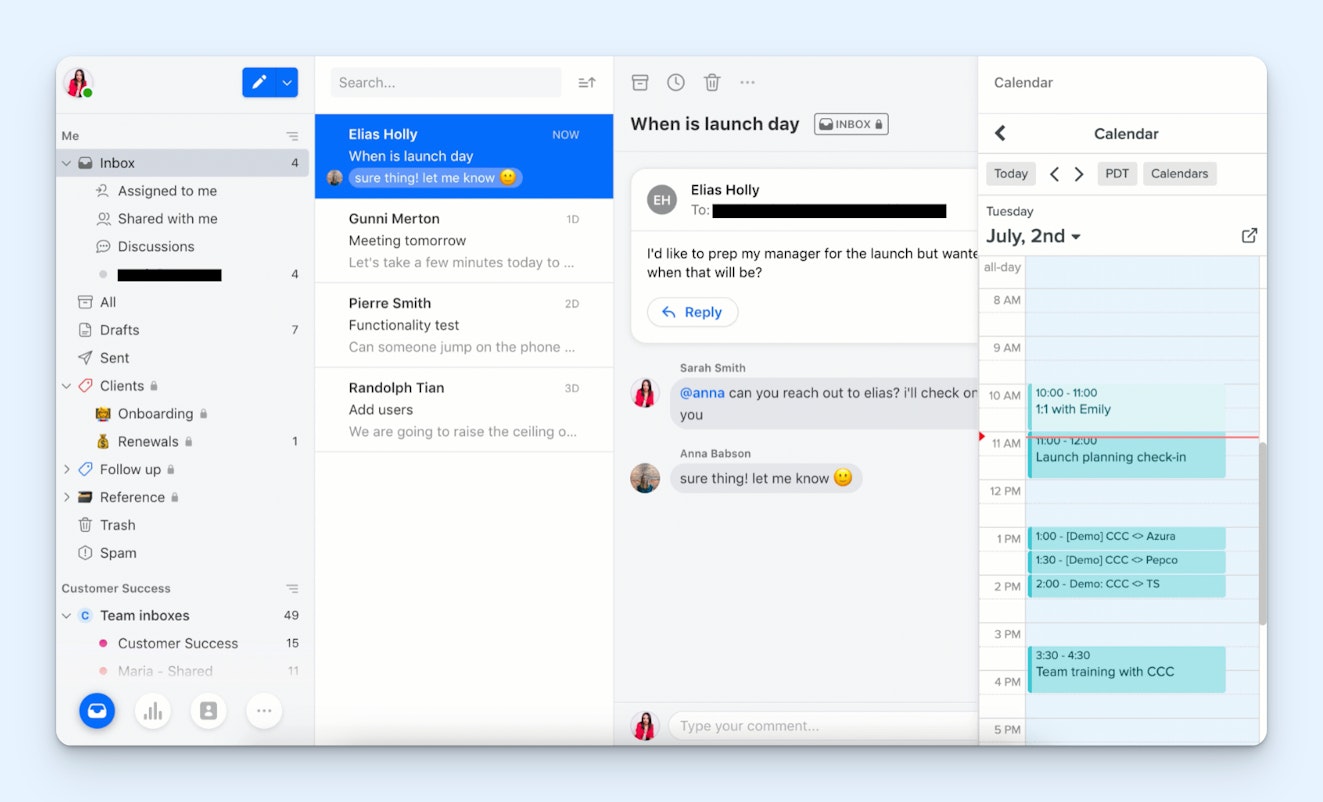
Front combines the familiarity of email across multiple channels with features built specifically for team collaboration and the blending of AI functionality. It centralizes every message from email, SMS, live chat, and even social channels, allowing SaaS teams to manage conversations without losing the flexibility of an email client.
Where Front differentiates itself is in how it augments this experience with AI. Agents can use Copilot to draft replies, Autopilot to handle simple queries, and conversation summaries to quickly review long threads.
Managers gain access to Smart CSAT and Smart QA, which automatically measure quality and surface conversation trends without requiring manual input. These tools don’t replace the personal touch of email but give teams a way to deliver faster, more consistent responses at scale through the use of AI.
For SaaS businesses that need visibility, reporting, and workflow automation, Front offers a practical balance of personal communication and structured oversight.
Key features for SaaS teams
Centralized inbox for email, SMS, live chat, and social.
Real‑time collaboration with tagging, comments, and shared drafts.
AI features: Copilot for reply suggestions, Autopilot for simple automation, and conversation summaries.
Conversation intelligence: Smart CSAT and Smart QA for quality measurement.
Workflow automation and routing with Playbooks.
Integrations with CRM, analytics, and project tools.
Pricing
Free trial available. View Front’s current pricing.
5. HubSpot Service Hub — Best SaaS help desk for lifecycle management

HubSpot Service Hub is a great fit for SaaS companies that use HubSpot across other non-support functions.
What makes it stand out is its ability to connect support with the entire customer lifecycle. Because it’s native to HubSpot, support agents see every interaction a customer has had with sales and marketing, all without leaving their workspace. This context enables smarter conversations, quicker resolutions, and more personalized service.
Its tight integration also means leaders can tie support performance directly to revenue impact, a feature not commonly found in standalone help desks.
HubSpot’s Breeze AI brings additional power, surfacing the right knowledge base article, drafting responses in a customer’s preferred tone, and automating repetitive workflows.
Combined with HubSpot’s extensive app marketplace, Service Hub gives SaaS companies the rare ability to unify customer data, communication, and growth strategies in one ecosystem. While that can be very powerful, it also requires a full investment in HubSpot’s platform, so it’s only worth exploring if you’re willing to adopt the entire ecosystem.
Key features for SaaS teams
Unified sales, marketing, and service platform for full customer lifecycle visibility.
CRM-integrated workflows with shared customer context.
Breeze AI for smarter replies, automation, and personalization.
Deep reporting that connects support activity to churn and revenue metrics.
1,700+ marketplace integrations to extend functionality.
Pricing
Free plan and trial available. View Service Hub’s current pricing.
6. Intercom — Best SaaS help desk for in-app engagement and chatbots
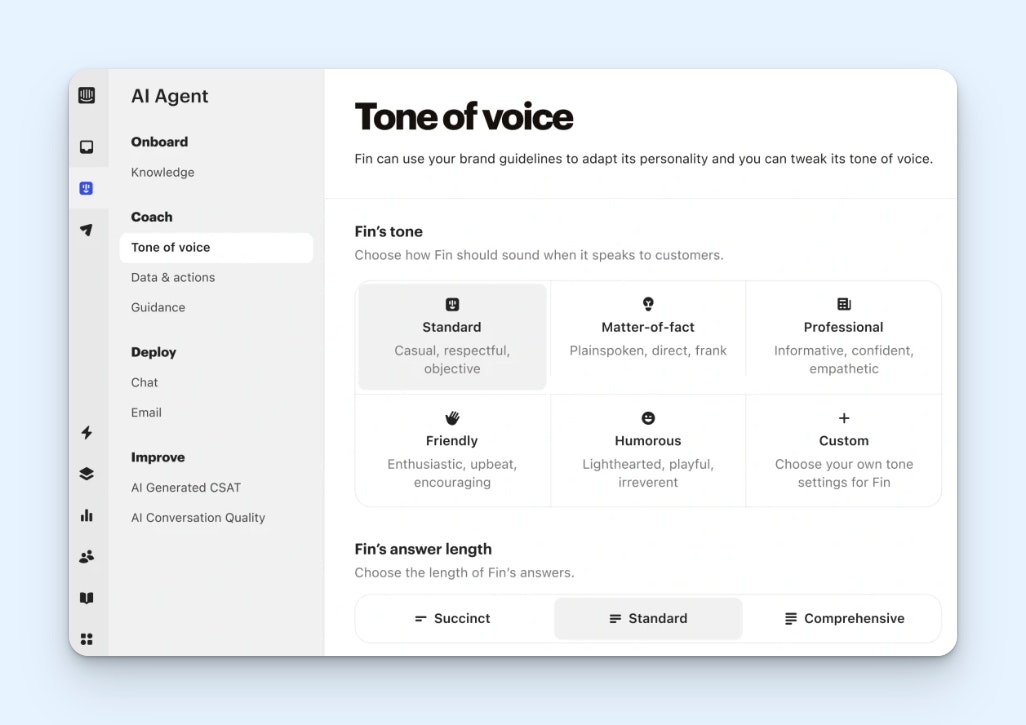
Intercom combines customer engagement and support, making it especially powerful for product-led SaaS businesses. Its hallmark is how deeply it embeds inside your product: In-app messaging, onboarding tours, and the Fin AI bot all work together to help customers before they ever open a ticket. This reduces support volume and can also drive product adoption and retention.
What makes Intercom unique is the way it merges marketing-style engagement with traditional support conversation. Its Messenger interface feels natural to users inside a SaaS app, blurring the line between getting help and discovering new features.
Beyond the basics, Intercom also offers robust targeting and segmentation, letting you deliver personalized support and onboarding experiences based on user behavior or demographics.
For SaaS companies that want support to double as a growth lever, Intercom’s support and marketing combination is worth exploring. The main caution is cost: Pricing can escalate quickly as usage and automation expand, so teams should budget carefully.
Key features for SaaS teams
In-app contextual messaging with branded Messenger interface.
Fin AI bot for fast, natural, AI-generated replies.
Guided product tours and onboarding flows.
User segmentation and behavioral targeting for personalization.
Unified inbox across email, chat, and in-app channels.
Reporting and analytics that tie support outcomes to product engagement.
Pricing
Free trial available. View Intercom’s current pricing.
7. Hiver — Best SaaS help desk for Gmail-native teams

Hiver transforms Gmail into a full-fledged help desk, making it particularly appealing for SaaS startups that already live inside Google Workspace. Teams don’t need to adopt a new system — they simply layer support functionality on top of the Gmail interface they already know.
Where Hiver is unique is in how it has expanded beyond Gmail while keeping that Gmail-native core. Alongside shared inbox functionality, Hiver includes live chat, a lightweight knowledge base, and AI-powered tools that help summarize conversations and copy edit replies.
For companies wanting a straightforward, Google-native approach to support but with more modern capabilities, Hiver stands out from simple shared inboxes. The trade-off is scalability. Hiver is not designed for complex enterprise workflows, but for early-stage SaaS businesses that need a practical, integrated option, it delivers more than you might expect.
Key features for SaaS teams
Gmail-native shared inbox with collaboration built in.
Live chat integration alongside email.
Lightweight knowledge base for customer self-service.
AI tools for automating responses and categorizing requests.
SLA tracking and ticket assignment inside Gmail.
Reporting and analytics from within the Gmail interface.
Quick setup and intuitive onboarding for new team members.
Pricing
Free trial available. View Hiver’s current pricing.
8. Zendesk — Best SaaS help desk for enterprise scale

Zendesk has long been a go-to for large SaaS enterprises. It delivers omnichannel communication, advanced analytics, and access to 1,500+ integrations and apps. Compliance features like SOC 2 and HIPAA make it attractive for enterprise SaaS firms in regulated industries (but these are only available on the higher-cost plans).
Where Zendesk is unique is in its breadth and maturity. Few platforms offer such a wide marketplace of third-party apps or the ability to tailor workflows to very complex organizational structures. Enterprise-grade reliability, a strong global support network, and proven scalability make it appealing for SaaS businesses that operate across multiple regions and need to standardize their customer experience at scale.
Zendesk has also leaned into AI, offering tools for ticket classification, automated triage, and agent assistance. Its AI can suggest responses, detect intent, and help managers spot patterns across large volumes of conversations. These features make it easier for enterprise teams to maintain speed and consistency, though they do require thoughtful setup to get right. Some AI features also require purchasing additional add-ons.
However, all of this comes with trade-offs: With robust features and capabilities also comes complications and an overwhelming number of options. For example, triggers and automations are always confusing, no matter how long you’ve been using them. For smaller SaaS companies, Zendesk’s depth can feel overwhelming, adding unnecessary complexity and costs.
It’s a strong option for enterprises, but it’s rarely the best fit for leaner teams or SaaS startups.
Key features for SaaS teams
Customizable workflows and role-based permissions for complex orgs.
Extensive app marketplace (1,000+ integrations across categories).
Enterprise compliance (SOC 2, HIPAA, GDPR) with global data centers.
Advanced reporting, analytics, and customer journey dashboards.
Proven scalability and reliability for large distributed teams.
Pricing
Free trial available. View Zendesk’s current pricing.
How to choose the best SaaS help desk for your company
The challenges of SaaS support are unique. The good news is that there’s a help desk out there for everyone; the bad news is that finding the right solution for your support team can be tough.
When evaluating SaaS help desk platforms, here are some key factors to keep in mind:
Customer channels: Do your customers live in Slack, in Teams, in-app, on social, or in email? The channels you need to support should have a major influence on the help desk software you explore.
Team and company maturity: Startups usually need simplicity; larger teams often require more compliance and customization. Your company stage will affect the tools that make sense for you.
Integrations: Take a look at the rest of your tech stack. The right SaaS help desk for you is the one that works well with your CRM, analytics, and other tools.
Compliance: If you’re in a regulated industry or serving enterprise B2B customers, things like SOC 2, HIPAA, and GDPR are often essential.
Pricing model: Per-user, team-based, and contact-based pricing all impact scalability in different ways. Consider which option makes the most sense based on your support model, customer types, and current stage.
The right SaaS help desk depends on many different factors. Hopefully this guide helps you narrow down your list to find the option that works best for your business.







